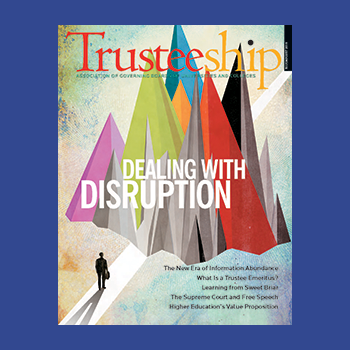Why this is important.
The value of higher education is a critical issue for boards because it directly impacts public trust, institutional sustainability, and the ability to fulfill the institution’s mission. Higher education provides significant benefits—such as increased career opportunities and personal growth—to individuals as well as to society through research, civic engagement, human capital development, and cultural advancement. However, public perceptions of higher education have declined, with concerns about affordability, access, and the practical value of a degree.
Boards must address these concerns by clearly articulating the institution’s contributions and advocating for its relevance in today’s world. As stewards of both the institution and the broader public interest, boards play a vital role in restoring and maintaining public confidence. By championing the value of higher education, boards help ensure continued support from students, families, policymakers, and donors, which is essential for the institution’s long-term success and for advancing the public good.
Sources:
Higher Education Governing Boards: An Introductory Guide for Members of College, University, and System Boards, AGB 2019
“Consequential Boards: Adding Value Where It Matters Most,” AGB 2014
The AGB 2017 Trustee Index: Trustees and Higher Education’s Value Proposition, AGB 2017
Questions for boards.
Click below to reveal key questions for your board to consider:
Communicating and Advocating Value
- Is the board prepared to explain the value and importance of a college degree to key constituencies, including students, parents, donors, policymakers, and the public?
- Are the board and administration united in their vision for market-responsive educational outcomes and the institution’s public purpose?
Academic Quality and Innovation
- How is the institution distinct, and how are faculty members and staff transforming programs and curricula to meet the needs of today’s students and the global economy?
- Is the board encouraging innovation in student services and academic programs to improve student outcomes and career readiness?
Student Demographics and Success
- What is the makeup of the student body, and is the institution meeting the needs of diverse student populations?
- Are retention and graduation rates, including those by race, ethnicity, and gender, improving or declining? What are the key roadblocks to student success, and how can they be addressed?
Affordability and Financial Sustainability
- How much has tuition risen, and what is the average student debt for graduates and non-completers?
- Are financial aid policies clear and sustainable?
Recommended resources.
We carefully curated these staff-picked resources for you:
Encouraging Academic Freedom and the Value of Higher Education
Trusteeship magazine, March/April 2025
By Ross Mugler
Americans’ Changing Relationship with Higher Education
Trusteeship magazine, March/April 2024
By Paul Tough
Exploring the Value Proposition of Higher Education
Trusteeship magazine, July/August 2015
By AGB














